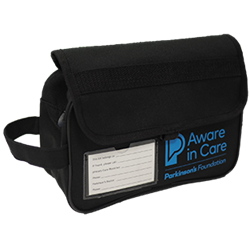A few weeks ago I had the opportunity to attend a training session on the general topic of what happens when a person with Parkinson’s is hospitalized. I’ve encouraged people to order these Aware in Care packages for years, but now I have an even better understanding of WHY we want these bags and how to use them. For more information on the Kit’s themselves, click here – AIC Bags.

I won’t go into greater detail about the kit here but what we learned at this training is that for the greater medical community, they know little or nothing about Parkinson’s and in looking back, it’s easy to see examples. Included in this was the first time I saw a new PHP she made a big deal of telling me how she read up on Parkinson’s and gave me a ton of literature. I doubt she had any other PD patients.
Yes, I believe that everyone has their own expertise and not every health profession needs to know about Parkinson’s, we as PWP need to make sure all of our team, including dentists, PT, etc. are highly knowledgeable about PD if at all possible. A friend was recently hospitalized for a heart problem. After surgery he was in rehab a few days and they complained his blood pressure was irregular and sent him back to hospital and it took 3 days for them to realize that this was a Parkinson’s disease symptom. Parkinson’s Foundation’s statistics state that Parkinson’s patients are generally in the hospital more days than non-Parkinson’s patients. 3/4 have mistakes made in their medicine and 2/3 of those have complications, usually from wrong medicines, wrong timing, etc. Other problems that can happen include a PHP or hospitalist using a wrong code to label a Parkinson’s symptom as something else, for example, mistaking Parkinson’s constipation for IBS. This can have long term side effects in our medical records.
The Ambassador program is going to address several audiences. We are going to address the following groups:
- Support Groups – make sure everyone obtains an Aware in Care bag and an explanation of what’s in it. We want to stress the importance of insisting on your medicine at the correct time and NO substitutions, offer to user our own if necessary. Encourage them to use MDS if possible and be careful if their neurologist does not specialize in PDF
- Movement Disorder Specialist practices – Leave post cards for ordering AIC bags and other literature to download.
- Other medical practices- give them the basics of PD, stressing how important it is to get medicines on time, the variability of symptoms, etc. Order literature kit for them if they want it
- Hospitals – same as above, but also encourage them to have a policy to call a neurologist and Parkinson’s aware physical therapist whenever a PWP is hospitalized.
- Medical and nursing schools. Review the whole presentation for Parkinson’s Foundation and give them ideas for working with PWP in the future.
So in general I’m excited about working on this both in NY and Florida but I’m concerned how many people are we talking about. I didn’t know if a typical hospital see’s 1,10, or 100 PD patients a month for example. So I’ve started on support groups, but I’ve waiting on some of my other contacts.
So my message to my friends with Parkinson’s is to question every professional including dentist, chiropractors, etc. as to how many Parkinson’s patients they treat and look at every new symptom as to whether or not it can be from Parkinson’s. Also make sure your pharmacist checks any new prescription for compatibility